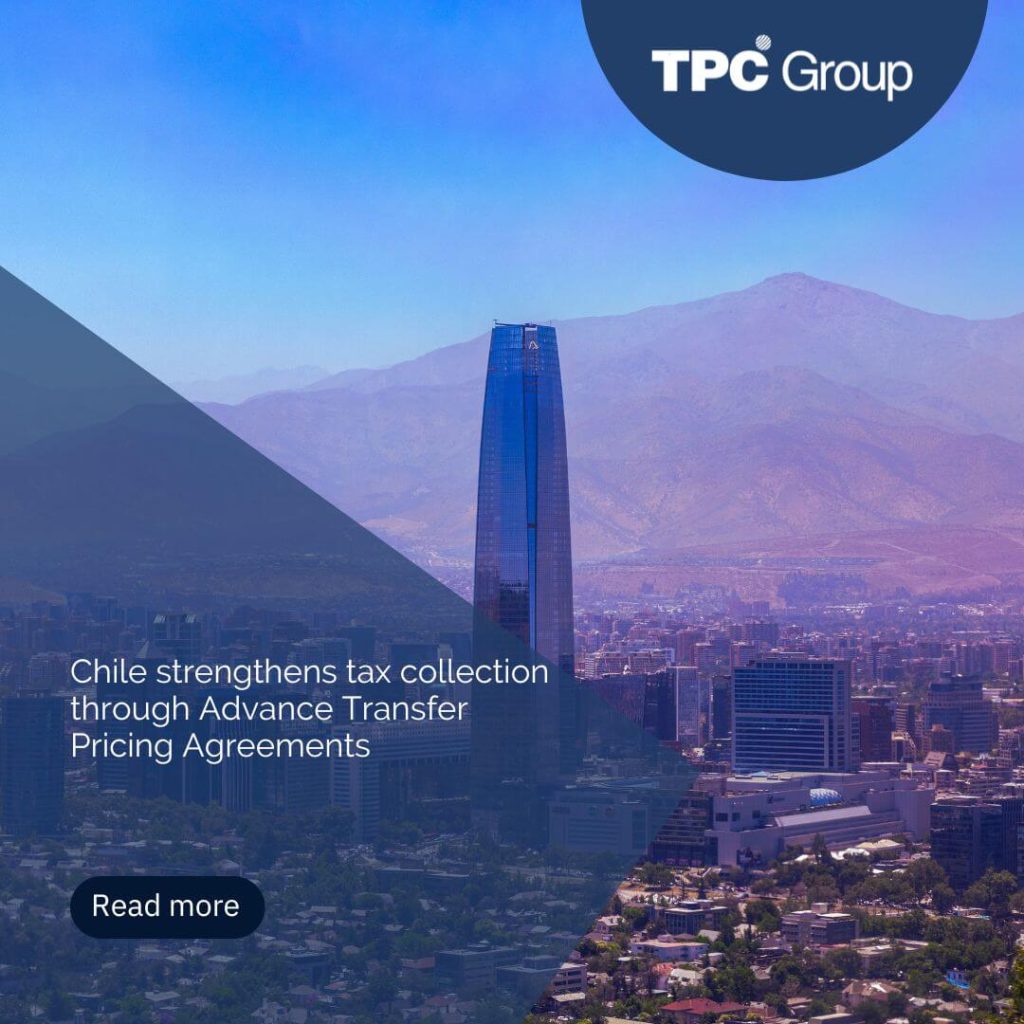Concept and Regulation in Chile
Chile, an OECD member country, has been amending its transfer pricing regulations, to such a degree to adapt to the OECD indications.
In 1998, through Circular No. 3, Chile has incorporated regulations related to Transfer Pricing into its legislation.
Conversely, it was not until 2012 when Law 20.630 reformed the rules thereon, incorporating measures according to the Transfer Pricing Guidelines of the Organization for Economic Cooperation and Development (OECD) in Article 41-E of the Income Tax Law (the Law).
As a member country of the aforementioned organization, it has continued to amend its Transfer Pricing regime as of 2016, according to Action 13 of the BEPS Plan (Base Erosion and Profit Shifting), to take measures against tax evasion or avoidance.
Arm’s Length Principle: Concept
The Arm’s Length Principle aims to ensure that the prices agreed for related-party transactions are at market value, understood as those agreed among independent parties.
In the Chilean case, the Income Tax Law has regulated this principle in Article 41-E, which states that transactions with related parties abroad must be carried out at normal market prices, values, or returns.
Likewise, those who have or would have agreed to or obtained independent parties in comparable transactions and circumstances will be understood as such.
Definition of Related Party in Chile
In order to apply the Transfer Pricing rules, the parties involved in the operation, reorganization, or restructuring in question must fall under one of the relationship cases contemplated in section 1 of the Law, according to which such parties will be considered related in the following cases:
- When there is direct or indirect participation in the entity management, or the same person(s) directly or indirectly participates in the direction, control, capital, profits, or revenues of both parties, thus being related to each other.
- When it involves a subsidiary, branch, or office related to its headquarters, other permanent establishments thereof, related parties of the latter, or the permanent establishments of the above-mentioned.
- When transactions are carried out with tax havens for tax regulations but for agreements to exchange information relevant to the application of tax provisions in force.
- For individuals, when there are consanguinity and/or affinity links.
- When a party carries out one or more operations with a third party that, in turn, directly or indirectly carries out with a related party of that party, one or more similar or identical operations to those it performs with the first, regardless of the capacity in which said third party and the parties participate in such operations.
Transfer Pricing Methods in Chile
The Transfer Pricing regime in Chile consists of six methods to analyze whether the prices agreed upon among related parties are at normal market values.
According to No. 2 of Article 41- E of the Law, these will be the following:
- Comparable Uncontrolled Price Method.
- Resale Price Method.
- Cost Plus Method.
- Profit Split Method.
- Transactional Net Margin Method.
- Residual Methods.
Taxpayers must select the most appropriate method, considering the particularities of the case. It evaluates the advantages and disadvantages of each, its applicability according to the type of transactions, specific circumstances, the availability of relevant information, the existence of comparable transactions, and comparability criteria.
Comparability Analysis in Chile
According to Article 3.2 of Circular No. 29, issued by the SII (Servicio de Impuestos Internos – Internal Revenue Service), the following criteria will be followed to perform the comparability analysis:
- Characteristics of the goods or services.
- Analysis of the functions, assets, and risks of the transactions analyzed.
- The contractual clauses of the transaction.
- The economic circumstances of the market.
- The business strategies.
The Tax Authority accepts the use of foreign comparables, along with supporting information.
Transfer Pricing Documentation and Declarations in Chile
The Transfer Pricing regime in Chile establishes, as part of its formal obligations, that taxpayers performing related-party transactions must have a Technical Study under paragraph 3 of Article 41-E of the Law.
Likewise, according to paragraph 6 of the aforementioned Article, they may also be required to file an information statement under the forms and terms established by the SII.
It should be noted that since 2016, Chile has been adapting to Action 13 of the OECD BEPS plan, introducing the Country by Country Report (CbC Report) as one of the three levels of the documentation outlined in that action.
Later, in August 2020, it introduced the other two levels of documentation, the Local Report and the Master File.
Informative Affidavit in Chile
According to Resolution No. 126 of 2016, an Annual Transfer Pricing Affidavit must be filed on Form 1907 when one of the following cases applies:
- Taxpayers that, as of December 31 of the reported year, belong to the Medium or Large Company segments and have carried out transactions with related parties abroad in such year.
- Taxpayers excluded in the previous assumption carrying out transactions with tax havens.
- Taxpayers who, not included in the first case, in the corresponding reporting period, have carried out transactions with related parties abroad for amounts exceeding $ 500,000,000 (five hundred million Chilean pesos).
The above declaration must be filed on the last working day of June of each year regarding the transactions carried out in the previous commercial year.
Hence, as of 2016, the three levels of documentation indicated by the OECD were implemented. Thus, the following declarations must be filed, if applicable:
Local Report
As established by the SII, they will be required to file this declaration when they meet these conditions:
- Belong to the Large Companies segment under the SII criteria.
- The parent or controlling entity of the Multinational Group of Companies must have filed the Country by Country Report with the Internal Revenue Service or other Tax Administration for the respective tax year.
- In the year in question, they have carried out one or more transactions with related parties not domiciled in Chile for amounts exceeding Ch$200,000,000 (two hundred million Chilean pesos).
Master File
According to the above Resolution, taxpayers who meet any of the following conditions must file the Informative Affidavit called Master File through Form 1950 and attachment:
- The parent or controlling entity of the Multinational Group of Companies, which has a residence in Chile for tax purposes to the extent that the income of the entities member of such Group in Chile and abroad, as of December 31 of the reporting year, is at least seven hundred and fifty million Euros (EUR 750,000,000) at the expiration of the consolidated financial statements.
- The member entity of the Multinational Group of Companies with residence in Chile for tax purposes that has been designated by the parent or controlling entity of such Group as the only substitute of the latter to file the Country by Country Report Affidavit in its country of tax residence, on behalf of the parent or controlling entity.
Country by Country Report
The mandatory filing of the Report Country by Country Affidavit, on Form 1937, is established for the following cases:
- The controlling or parent entity of the Multinational Group of Companies with residence in Chile for tax purposes to the extent that the income of all the member entities, in 12 months previous to the beginning of the corresponding tax period, is at least 750 million euros at the expiration of the consolidated financial statements.
- A member entity of the Group that is resident in Chile for tax purposes and has been designated by the parent or controlling entity of the Group as its sole substitute.
The deadline to file the aforementioned annual affidavits and their annexes will expire on the last working day of June of each year concerning the transactions carried out during the immediately preceding business year.
In turn, said term may be extended once for up to three months, thus filing it before the expiration of the original term.
Technical Transfer Pricing Study in Chile
Paragraph 3 of Article 41-E of the Law states that taxpayers may attach a Transfer Pricing Study that supports the pricing, values, or profitability of their related-party transactions.
Non-Compliance Penalties in Chile
According to Circular No. 29 of 2022 and section 6 of Article 41-E of the Law, the penalties for the lack of submission or erroneous, incomplete, late, or maliciously false filing of these affidavits and the informative Transfer Pricing affidavits will range from 1 to 50 Annual Tax Units (ATU).
The indicated fines may not exceed the equivalent of 15% of the capital or 5% of the effective capital, which is higher.
Regarding the Affidavits 1907 (Informative Affidavit), 1937 (Country by Country Report), 1950 (Master File), and 1951 (Local Report), fines are applied as follows:
| Affidavit Filing | Penalty fee |
|---|---|
| Late Filing of the Affidavit | Up to 45 days delay: 15 ATU – From 46 days delay to 90 days delay: 20 ATU – 91 days delay onwards: 30 ATU |
| Non-submission | 50 ATU |
| Incomplete or erroneous submission: | 10 ATU |
| Maliciously false filing | From 50% to 300% of the value of the tax evaded, along with imprisonment from mid to maximum degree. |






